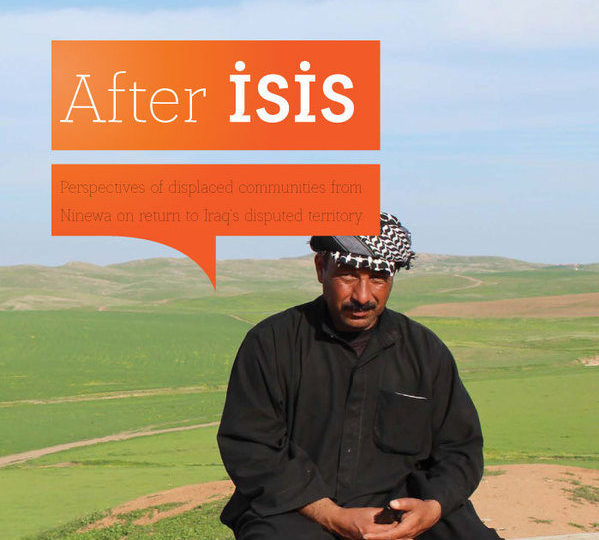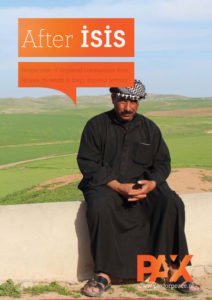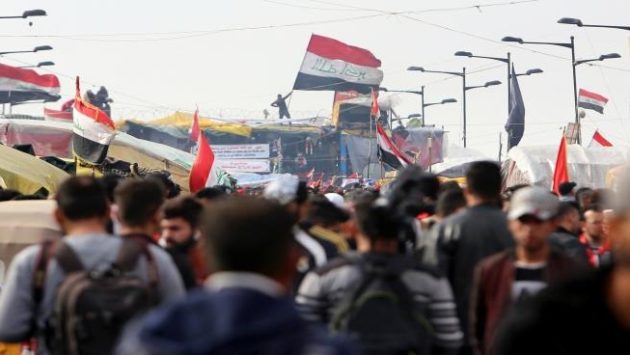PAX Iraq Alert IV | October 24th 2016
Mosul: Peacebuilding After ISIS
With the offensive on Mosul unfolding, awareness is growing that one day, military groups united in the struggle against ISIS in Iraq will no longer have a common enemy. New conflict dynamics will emerge that need to be addressed urgently. While the need for a longer-term political strategy is now broadly recognized, the Coalition seems to leave the responsibility for such a strategy mainly in the hands of the Iraqi and Kurdish governments. However, the intervention of the Global Coalition against ISIS has a direct impact on ongoing local conflict dynamics.
PAX therefore believes that the Coalition carries heavy responsibility for Iraq beyond ISIS and should be more directly involved in and committed to such a longer term political strategy. The recent international meeting in Paris, co-hosted by France and Iraq, on Mosul after ISIS was an important step to build such a strategy, but participation of local civil society and local leaders was lacking. Without transparent and inclusive planning based on ongoing community consultation, armed actors will seek to turn military victories on the ground into a new status quo, in pursuit of their own territorial or sectarian agendas. PAX is concerned that this engenders new conflict and clears the ground for new insurgent groups.
Of particular concern is the lack of a framework for transitional justice in areas where ISIS retreats. Where this is absent, ad hoc arrangements on justice, compensation and return imposed by the ‘liberators’ risk to result in a new cycle of violence.
PAX therefore believes that the Coalition needs to take its share of responsibility for a comprehensive and longer-term stabilization and peacebuilding strategy for all of Iraq that involves all conflict drivers and facilitates political solutions that address the needs, interests and (historical) grievances of all the different stakeholders on the ground.
Recommendations
The International Coalition against ISIS, including the governments of Iraq and Kurdistan, EU member states and the United States, should develop, with UN agencies, a comprehensive and longer-term peacebuilding plan. This plan should be developed as part of a consistent political strategy for Iraq, which:
· Consists of an agreed-upon political strategy that aims to not just stabilize, but to also address the deeper roots of the various conflicts, grievances and tensions in Iraq, including the conflict over the Disputed Internal Boundaries areas (DIBs);
· Takes into consideration all good practices regarding humanitarian (post-)conflict crisis response, including improved coordination between the short, medium and longer-term stages in order to prevent duplication or, worse, gaps emerging;
· Resists political and military pressure to decide quickly on the status of areas under dispute by promoting a transition phase during which communities can resettle, re-engage in political life, restore community relations and rebuild community resilience;
· Provides entry points and political support for the development of inclusive bottom-up initiatives on local and regional levels as a way to address questions over governance;
· Ensures the inclusion in such processes of all marginalized groups as well as communities that lived under ISIS, as a vital element ensuring protection of human rights and avoiding renewed radicalization;
· Is mindful of the politicized context of displacement and return and promotes the development of a durable and conflict-sensitive framework for return, including guarantees in accordance with international humanitarian law, between the international community and the governments of Iraq and Kurdistan.
· Promotes the conditions to develop an Iraqi framework for transitional justice and calls for a mechanism for international support complemented by national legal reform to address violations of international law, including war crimes, crimes against humanity and genocide, which includes, but is not limited to ISIS crimes; and
· Makes available international expertise on the ground where ISIS retreats, to support local communities in their transitional justice initiatives, including evidence gathering and documentation, and to link these back to the National Reconciliation Committee, ensuring input for the development of a national framework on transitional justice.
For more analysis of the PAX Iraq Alert IV click here.





